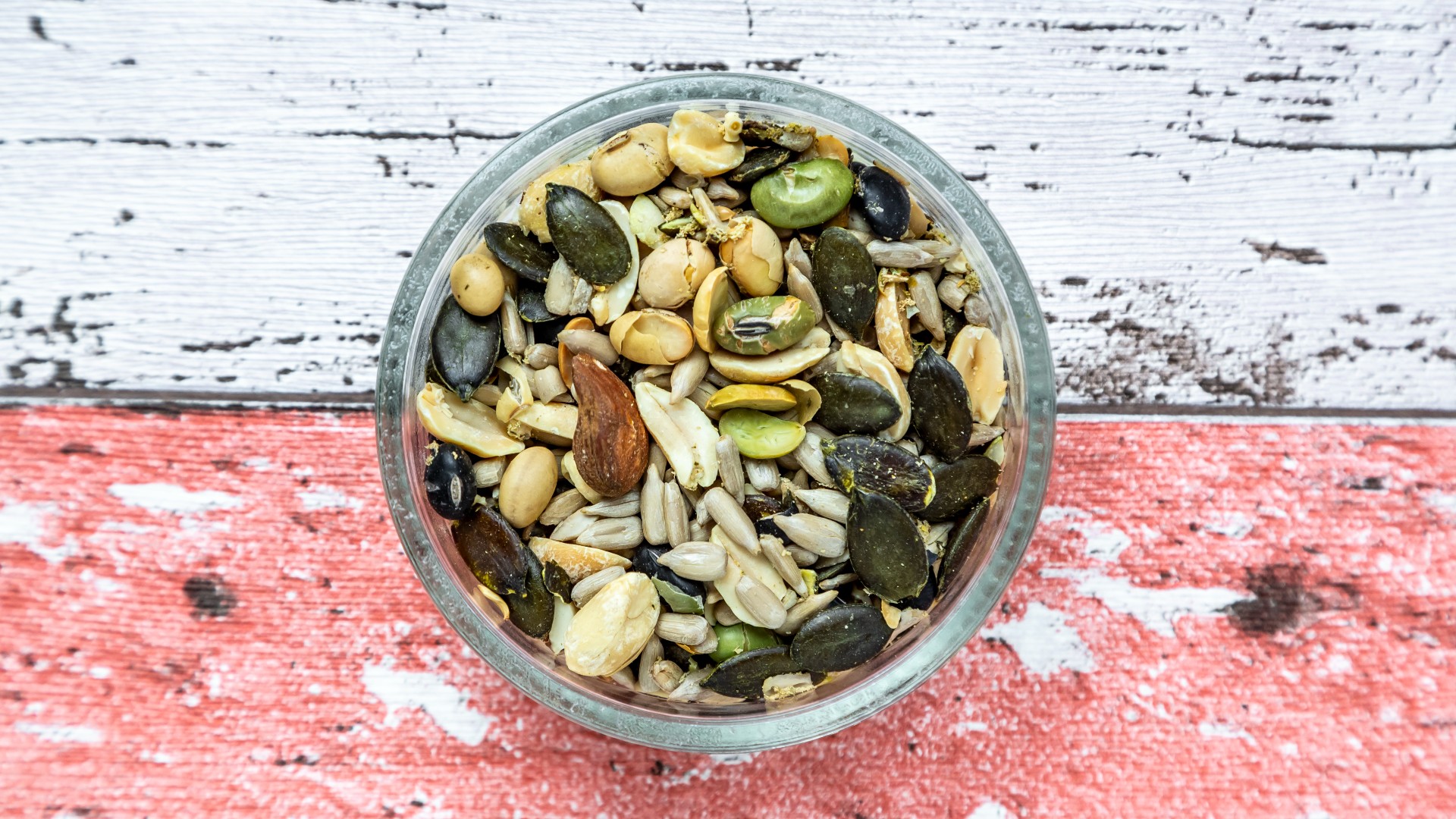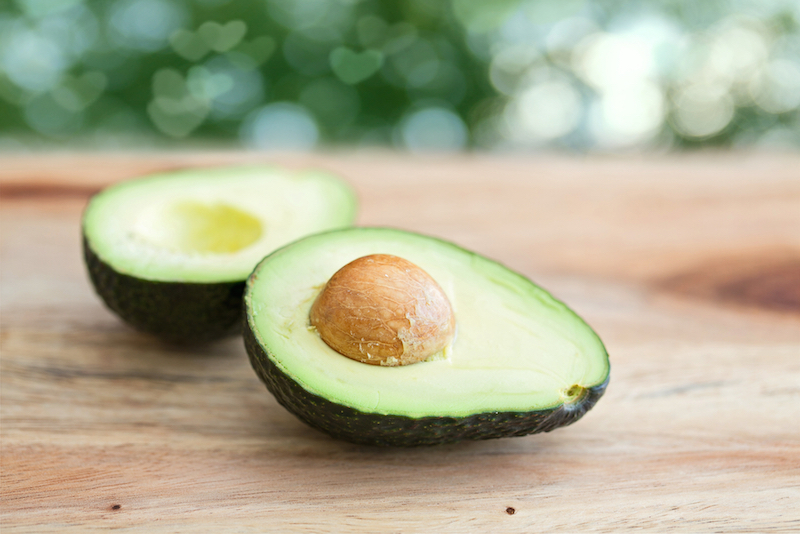What can you eat on a vegan keto diet?
What can you eat on a vegan keto diet? Here’s a comprehensive guide to the ketogenic diet for those who don’t eat animal products

Get the world’s most fascinating discoveries delivered straight to your inbox.
You are now subscribed
Your newsletter sign-up was successful
Want to add more newsletters?

Delivered Daily
Daily Newsletter
Sign up for the latest discoveries, groundbreaking research and fascinating breakthroughs that impact you and the wider world direct to your inbox.

Once a week
Life's Little Mysteries
Feed your curiosity with an exclusive mystery every week, solved with science and delivered direct to your inbox before it's seen anywhere else.

Once a week
How It Works
Sign up to our free science & technology newsletter for your weekly fix of fascinating articles, quick quizzes, amazing images, and more

Delivered daily
Space.com Newsletter
Breaking space news, the latest updates on rocket launches, skywatching events and more!

Once a month
Watch This Space
Sign up to our monthly entertainment newsletter to keep up with all our coverage of the latest sci-fi and space movies, tv shows, games and books.

Once a week
Night Sky This Week
Discover this week's must-see night sky events, moon phases, and stunning astrophotos. Sign up for our skywatching newsletter and explore the universe with us!
Join the club
Get full access to premium articles, exclusive features and a growing list of member rewards.
What can you eat on a vegan keto diet? And is it even possible to combine these two restrictive dietary patterns together? There are many reasons why people may decide to follow a keto diet. Cutting down on carbohydrates can promote rapid weight loss, improve blood sugar metabolism and even boost longevity, for starters.
The problem is, a classic keto diet consists almost entirely of animal-based products and strongly advises avoiding most fruit and vegetables. If you’re a passionate vegan (or you simply can’t stand the taste of meat and dairy), that may sound like a deal breaker. But it doesn’t need to be.
Following a vegan keto diet is surely not an easy task and it will require quite a lot of planning and preparation. Most likely, you will have to go out of your comfort zone, try new foods and learn new recipes. Chances are, you will also have to invest in some dietary supplements and the best vegan protein powder. But if you’re ready to shake things up a bit, keep reading. In this article, we will discuss what you can eat on a vegan keto diet and the pros and cons of changing your dietary habits.
What is a vegan keto diet?
In a nutshell, a vegan keto diet combines plant-based eating with an extremely low carbohydrate intake. To better understand how it may work in practice, let’s start by discussing the principles behind both of these approaches.
To put it simply, ketogenic diets focus heavily on the overall macronutrient ratio, while vegan diets are very particular about the types of food you can eat. Vegan diets exclude everything that is either made of animals, uses animal derivatives or harms living creatures in any way. That means no meat, dairy or eggs, but also no honey, shellac or bee pollen. Many table dressings, sauces, alcoholic drinks and processed foods will also land on the red list. Always check whether a particular food product has been branded as vegan-friendly – you may be shocked to see how many grocery items are not fully plant-based.
The next step is making sure you eat according to the recommended macronutrient ratio. Ketogenic diets contain approximately 75% of dietary fat, around 15-20% of protein, and up to 10% of carbohydrates. Also, the amount of net carbohydrates (total carbohydrates minus dietary fiber) in a single food item should not be higher than 25g.
Have a look at our guide to 'what fruits can you eat on keto' for a list of low-carb, keto-friendly fruits.
Get the world’s most fascinating discoveries delivered straight to your inbox.

The main aim of keto is to achieve the state of ketosis – a metabolic condition in which the body runs out of glucose and turns to burning fat reserves. When blood glucose levels are very low, insulin production drops and ketones become the primary source of energy for the body. Ketones are fatty compounds produced by the liver and are used to fuel up muscles and other tissues. Achieving a consistent state of ketosis is the key to success with ketogenic diets, so you need to be prepared to continuously monitor your carbohydrate intake. Calorie counting apps and glycemic index tables will surely come in handy.
Are there any benefits of a vegan keto diet?
Ketogenic diets have become extremely popular in recent years, mostly due to their ability to promote rapid weight loss. But that’s not the only health benefit linked to this dietary approach. According to the recent review published in the Nutrients journal, ketogenic diets have been shown to have a positive impact on gut microbiome, blood lipid profile and appetite control. They could also reduce the risk of developing many chronic conditions, including cardiovascular disease, type 2 diabetes, and certain types of cancer.
And it’s not just your physical health that can benefit. A recent study published in Mental Health Clinician even suggests that following ketogenic diets can be helpful for treating a range of psychiatric disorders. At the same time, researchers from the journal Atherosclerosis point out that the heavy intake of saturated fats – a key feature of classic keto – can lead to a steep rise in ‘bad’ cholesterol, dyslipidemia and heart problems.
Similarly, veganism has been enjoying a growing popularity. Environmentally-friendly and cruelty-free, plant-based diets are also very beneficial for our health. According to Nutrition Reviews, they tend to consistently rate higher than the non-vegetarian ones in terms of their quality and nutritional value. A 2022 review of multiple studies published in Current Nutrition Reports reveals how vegan diets can reduce the risk of developing several different types of cancer. What’s more, a recent meta-analysis published in Frontiers in Cardiovascular Medicine has shown that vegan diets can boost longevity and protect against cardiovascular problems. They can also reduce the risk of developing type 2 diabetes, according to a study in Nutrients.
Up to date, there’s very little research into the health effects of a combined vegan keto diet. However, it’s possible to assume that turning towards unsaturated fatty acids and plant-based protein sources could balance out the potential negative cardiometabolic properties of ketogenic diets. Also, adding a vegan component could likely magnify the keto’s anti-diabetic potential. Therefore it’s highly likely that switching to a vegan keto diet could be a great choice for your overall health and well-being. However, more quality studies are needed to establish whether that’s the case.
Vegan keto diet: Foods to eat
Classic ketogenic diets are based largely on meat, fish and eggs, which provide copious amounts of dietary fat to help fit in with the recommended macronutrient guidelines. However, if you want to switch to a vegan keto diet, you need to get familiar with alternative plant-based sources. Look for different types of nuts, seeds, oils and oily foods to put into your shopping basket.
For example:
- Healthy plant cooking oils, such as olive oil, avocado oil, peanut oil, coconut oil, and sunflower oil.
- Avocados and coconut products, such as coconut milk, coconut cream, guacamole and avocado paste.
- Nuts, such as almonds, Brazil nuts, walnuts and macadamia nuts.
Another important aspect is adequate protein consumption. Though animal-based products are considered to be a high quality, complete source of protein, plants can also deliver a good deal of this important macronutrient. For best results, mix and match different food items to get a good variety of aminoacids in your diet.
For example:
- Nuts and nut products, such as peanut butter.
- Seeds, such as hemp seeds, chia seeds, and pumpkin seeds.
- Tofu, tempeh and other processed soybean-based products.
- Quinoa, amaranth and other pseudograins.
- Certain vegetables, such as broccoli and green leafy vegetables.
- Nutritional yeast.

Being on a vegan keto diet also means that you’re free to eat plant-based meat, egg and dairy alternatives, as long as they fit into your macronutrient ratio. You also have a green light when it comes to non-starchy vegetables, including green leafy vegetables, onions, tomatoes, cauliflower, broccoli and peppers. In addition, it’s safe to eat most mushrooms, fungi, herbs and spices.
Vegan keto diet: Foods to avoid
Classic vegan diets include a plethora of fruit, grains, beans, legumes and root vegetables. However, these food groups are high in carbohydrates and therefore are not allowed with keto. Though when it comes to fruit, certain concessions can be made. Berries (such as strawberries, raspberries, blueberries and blackberries) are relatively low in sugars and can be enjoyed sparingly. Similarly, lemons, kiwis and grapefruit may also be consumed in small amounts.
When you’re on a vegan keto diet, it’s best to avoid most alcoholic drinks, beers and liquors in particular. Not only are they high in sugars, there’s also little research into the links between alcohol consumption and ketosis. Lastly, always read the label on processed food items - what may look like a low-carb option, more often than not is enriched with sugars and unsuitable for a vegan keto diet.
Vegan keto diet: Risks and considerations
Despite boasting many health benefits, a vegan keto diet comes with many risks and considerations. To start with, it’s an exceptionally restrictive way of eating.
“Restrictive diets can increase the risk of nutrient deficiencies, impact our gut microbiota and are not safe for a variety of health conditions”, says Josie Porter, dietitian at Doctify. They can also have a negative effect on mental health. “Emotionally, restrictive diets can lead to disordered eating which may impact emotional wellbeing.”
A vegan keto diet in particular may lead to certain micronutrient deficiencies. According to a recent systematic review published in the Clinical Nutrition journal, following a plant-based diet may result in an inadequate intake of vitamin B12, zinc, calcium and selenium. Low-carbohydrate diets can also result in certain shortages, especially vitamin D, vitamin E, vitamin C, calcium and magnesium, as mentioned in the Journal of the International Society of Sports Nutrition. To make sure you don’t develop any deficiencies, it’s a good idea to top up your mineral and vitamin intake with a good quality supplement.

Secondly, due to its very high fat content, a vegan keto diet may be harmful to the liver in the long-term. “The liver has to work harder as it needs to process fats, just like it would alcohol or sugar. It is responsible for over 500 functions in the body, including fat burning, hormone regulation, blood production and toxins excretion. A toxic liver can lead to several health issues and promote chronic systemic inflammation”, explains Yalda Alaoui, nutritionist and founder at Eat Burn Sleep.
Low carbohydrate intake can also pose some issues. “Moderate insulin production is needed for serotonin production, the neurotransmitter which helps regulate mood. Following a ketogenic diet can lead to low mood due to impaired serotonin production”, says Alaoui. “Serotonin is also a natural appetite suppressant. While cutting down sugar might help reduce cravings to start with, being on such low carbohydrates for a long time can lead to a lack of satiety and consequently to overeating”.
Alaoui also points to the effect of low serotonin on sleep. “Serotonin is the precursor for melatonin, the sleep neurotransmitter. Lack of good quality sleep has been linked to unstable blood sugar levels”, she says.
Another issue that may arise when following a vegan keto diet, is its low fiber content. Fiber helps with metabolic and gastrointestinal issues, and it may be instrumental in preventing certain types of cancer. Fortunately, you can get your daily dose of roughage with supplements. Most of them come in a form of a powder that you can sprinkle into your meals or dissolve with water.
Lastly, many people experience a range of unpleasant symptoms when they start a ketogenic diet. “Suddenly switching to a diet that’s so low on carbohydrates can cause you to experience a range of symptoms similar to the common flu for the first few days or weeks”, says Giulia Guerrini, the lead pharmacist Medino digital pharmacy. “It’s also known as the keto flu”.
A vegan keto diet can be very beneficial to your health, but you need to be aware of the risks. It’s always a good idea to consult your doctor before starting a new diet too.
This article is for informational purposes only and is not meant to offer medical advice.
Bibliography
Dowis, K., & Banga, S. (2021). The Potential Health Benefits of the Ketogenic Diet: A Narrative Review. Nutrients, 13(5), 1654. https://doi.org/10.3390/nu13051654
Tillery, E. E., Ellis, K. D., Threatt, T. B., Reyes, H. A., Plummer, C. S., & Barney, L. R. (2021). The use of the ketogenic diet in the treatment of psychiatric disorders. The mental health clinician, 11(3), 211–219. https://doi.org/10.9740/mhc.2021.05.211
O'Neill, B., & Raggi, P. (2020). The ketogenic diet: Pros and cons. Atherosclerosis, 292, 119–126. https://doi.org/10.1016/j.atherosclerosis.2019.11.021
Parker, H. W., & Vadiveloo, M. K. (2019). Diet quality of vegetarian diets compared with nonvegetarian diets: a systematic review. Nutrition reviews, 77(3), 144–160. https://doi.org/10.1093/nutrit/nuy067
Quek, J., Lim, G., Lim, W. H., Ng, C. H., So, W. Z., Toh, J., Pan, X. H., Chin, Y. H., Muthiah, M. D., Chan, S. P., Foo, R., Yip, J., Neelakantan, N., Chong, M., Loh, P. H., & Chew, N. (2021). The Association of Plant-Based Diet With Cardiovascular Disease and Mortality: A Meta-Analysis and Systematic Review of Prospect Cohort Studies. Frontiers in cardiovascular medicine, 8, 756810. https://doi.org/10.3389/fcvm.2021.756810
Pollakova, D., Andreadi, A., Pacifici, F., Della-Morte, D., Lauro, D., & Tubili, C. (2021). The Impact of Vegan Diet in the Prevention and Treatment of Type 2 Diabetes: A Systematic Review. Nutrients, 13(6), 2123. https://doi.org/10.3390/nu13062123
Bakaloudi, D. R., Halloran, A., Rippin, H. L., Oikonomidou, A. C., Dardavesis, T. I., Williams, J., Wickramasinghe, K., Breda, J., & Chourdakis, M. (2021). Intake and adequacy of the vegan diet. A systematic review of the evidence. Clinical nutrition (Edinburgh, Scotland), 40(5), 3503–3521. https://doi.org/10.1016/j.clnu.2020.11.035
Calton J. B. (2010). Prevalence of micronutrient deficiency in popular diet plans. Journal of the International Society of Sports Nutrition, 7, 24. https://doi.org/10.1186/1550-2783-7-24

Anna Gora is a health writer at Live Science, having previously worked across Coach, Fit&Well, T3, TechRadar and Tom's Guide. She is a certified personal trainer, nutritionist and health coach with nearly 10 years of professional experience. Anna holds a Bachelor's degree in Nutrition from the Warsaw University of Life Sciences, a Master’s degree in Nutrition, Physical Activity & Public Health from the University of Bristol, as well as various health coaching certificates. She is passionate about empowering people to live a healthy lifestyle and promoting the benefits of a plant-based diet.
 Live Science Plus
Live Science Plus










